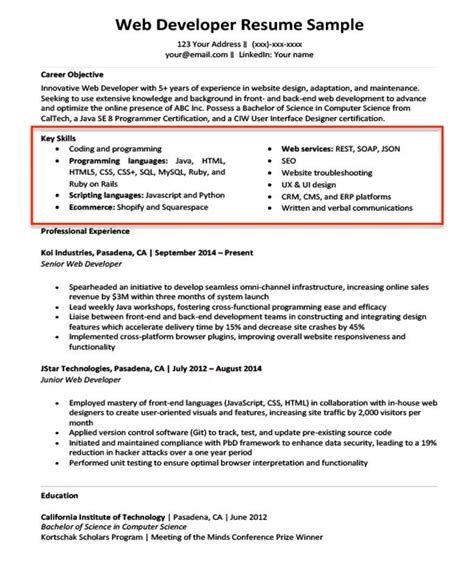Learn how to identify, develop, and customize key skills for each job in order to effectively highlight transferable skAre you struggling to effectively showcase your skills on your resume? Crafting a standout skills section is crucial in today’s competitive job market. In this blog post, we will explore the importance of identifying and highlighting key skills on your resume, along with tips for developing a skills section that captures the attention of hiring managers. We will also discuss the significance of showcasing transferable skills and customizing your key skills for each job application. By the end of this post, you will have a better understanding of how to effectively present your skillset to potential employers, ultimately increasing your chances of landing your dream job. Whether you are a recent graduate entering the workforce or a seasoned professional looking to make a career change, mastering the art of showcasing your key skills on your resume is essential. Let’s dive in and elevate your resume to the next level!
Identifying Key Skills
When it comes to creating an effective resume, one of the most important elements is clearly identifying your key skills. These are the abilities and attributes that make you stand out as a candidate and are directly related to the job you’re applying for. The first step in this process is to carefully review the job description and identify the specific skills and qualifications that the employer is looking for. Take note of any keywords or phrases that are repeated throughout the job posting, as these are likely to be the most important skills for the role.
Once you have a clear understanding of the skills and qualities that are most relevant to the position, it’s important to take stock of your own experiences and abilities. Consider your past work experience, education, and any relevant training or certifications you may have. Take note of any accomplishments or successes that demonstrate your proficiency in these key areas. It may also be helpful to seek feedback from colleagues, mentors, or previous employers to gain a clearer understanding of your strengths and skills.
After identifying your key skills, it’s essential to strategically incorporate them into your resume. This can be done by creating a dedicated skills section that prominently highlights these abilities. This section should be easy to read and quickly convey to the employer that you have the necessary qualifications for the job. Additionally, be sure to provide specific examples or brief explanations of how you have utilized these skills in previous roles. This not only reinforces your capabilities but also provides evidence of your experience and expertise.
Developing a Skills Section
When it comes to creating a strong resume, one of the most important sections to focus on is the Skills section. This is where you can highlight your strengths and abilities, and show potential employers what you bring to the table. Developing a Skills section that effectively showcases your key skills is essential in making a good first impression. It’s crucial to tailor this section to each job application, ensuring that you are highlighting the most relevant skills for the specific role.
One of the first steps in developing a Skills section is identifying your key skills. These are the abilities, knowledge, and attributes that make you a strong candidate for a particular role. By identifying your key skills, you can ensure that you are showcasing the most important qualities that make you a great fit for the job. This may include technical skills, soft skills, or specific industry-related knowledge.
Once you have identified your key skills, it’s important to customize them for each job application. This involves carefully reading the job description and understanding the specific skills and qualifications that the employer is looking for. By customizing your key skills for each job, you can better demonstrate your fit for the role and increase your chances of getting noticed by hiring managers.
Highlighting Transferable Skills
When it comes to creating a standout resume, it’s essential to highlight your transferable skills. These are the abilities and qualities that can be applied to a variety of roles and industries, making them incredibly valuable to potential employers. Whether you’re changing careers or looking to move up within your current field, showcasing your transferable skills can make a big difference in catching the attention of hiring managers.
One way to highlight your transferable skills is to create a dedicated skills section on your resume. This section should include abilities such as communication, leadership, problem-solving, and adaptability. By listing these skills in a clear and organized manner, you can effectively demonstrate to employers that you possess the qualities they’re looking for, regardless of the specific job title or industry.
In addition to including a skills section, it’s important to provide specific examples of how you’ve applied your transferable skills in past roles. This could involve describing a project where you used your communication skills to coordinate a team, or highlighting a time when your problem-solving abilities led to a successful outcome. By including these concrete examples, you can further illustrate the value of your transferable skills to potential employers.
Customizing Key Skills for Each Job
When applying for various jobs, it’s important to customize your key skills to match the requirements of each job. This means that you should carefully review the job description and identify the specific skills that are most important for the position.
Once you have identified the key skills required for the job, you can then tailor your resume to highlight those skills. This may involve rearranging the order of your skills or including different examples to demonstrate your proficiency in each area.
By customizing your key skills for each job, you can make your resume more targeted and relevant to the specific positions that you are applying for. This can greatly increase your chances of getting noticed by potential employers and landing the job that you want.
